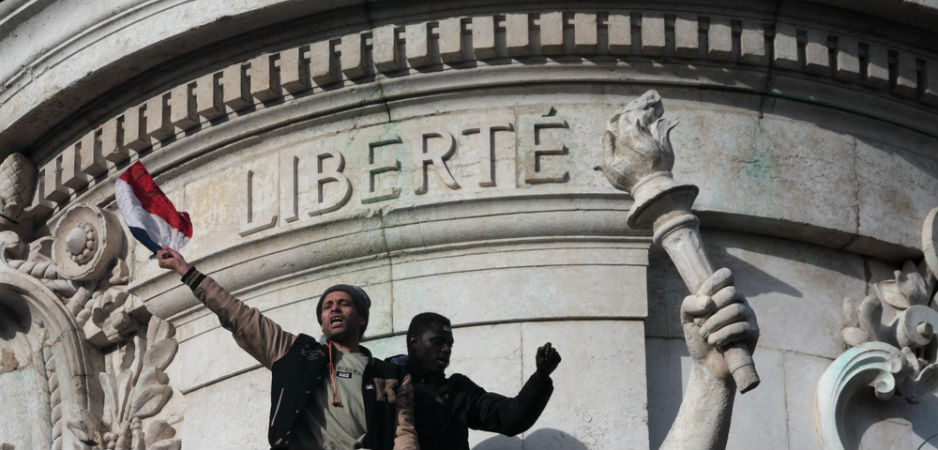Responding to terrorism with xenophobia and intolerance toward Muslims feeds straight into ISIS narratives about the West.
I am a young American woman currently living in Morocco. On November 13, I was heartbroken to learn of the attacks in Paris. Like many people, I was also deeply saddened by the voices of hatred and intolerance that emerged in their aftermath, and by the reminder of how selective we are in whom we choose to mourn.
The next morning, I watched the coverage of the attacks on Al Jazeera with a Moroccan family, who were every bit as outraged and disgusted as I was—if not more, because in addition to the sadness they felt for Parisians, they also had to watch, yet again, as their religion was used to justify senseless violence.
“Those people aren’t Muslims,” they told me over and over again. My former host father, Abdellah, explained how Islam condemns violence, and took comfort in his conviction that God will be the ultimate judge of terrorists.
Later that day, I got into a taxi with three men who assumed I was French and took the opportunity to tell me that they were horrified about the attacks, and that the terrorists do not represent Islam.
I felt sick at the realization that Moroccans felt the need to defend themselves to me in this way, as if I might think for a second that Daesh (the Arabic acronym for the “Islamic State” or ISIS) represents the world’s 1.6 billion Muslims, or the 33 million of them living in Morocco.
At the same time, I understood that urge, coming from people who have become accustomed to defending their religion in this way. Moroccans can’t stand the fact that every time a lunatic commits an act of terror in the name of Islam, Western pundits are given a platform to discuss the violence and radicalism of the entire religion. Part of their anger stems from the injustice of it all, and part from sadness and a deep desire for Westerners to better understand the religion they love.
In the year that I’ve lived here, not a single Moroccan has blamed me for the wrongdoing committed by the US government, let alone the violence that has been carried out in the name of Christianity. When we do discuss US foreign policy, Moroccans are often quick to assure me that they understand that America’s wars are the fault of our government and not the people.
If Moroccan Muslims don’t blame American citizens for actions committed by the government we elected, why is it so hard for us to differentiate the worldwide peaceful Muslim majority from a radical fringe group they have nothing to do with?
One thing is clear: Responding to terrorism with xenophobia and intolerance toward Muslims feeds straight into Daesh narratives about the West.
Here’s to hoping that in our pain and grief in the aftermath of last week’s violence all over the world, we collectively rise above the hatred Daesh hopes to engender, and show compassion instead.
The views expressed in this article are the author’s own and do not necessarily reflect Fair Observer’s editorial policy.
Photo Credit: Arenysam / Shutterstock.com
 We bring you perspectives from around the world. Help us to inform and educate. Your donation is tax-deductible. Join over 400 people to become a donor or you could choose to be a sponsor.
We bring you perspectives from around the world. Help us to inform and educate. Your donation is tax-deductible. Join over 400 people to become a donor or you could choose to be a sponsor.
Support Fair Observer
We rely on your support for our independence, diversity and quality.
For more than 10 years, Fair Observer has been free, fair and independent. No billionaire owns us, no advertisers control us. We are a reader-supported nonprofit. Unlike many other publications, we keep our content free for readers regardless of where they live or whether they can afford to pay. We have no paywalls and no ads.
In the post-truth era of fake news, echo chambers and filter bubbles, we publish a plurality of perspectives from around the world. Anyone can publish with us, but everyone goes through a rigorous editorial process. So, you get fact-checked, well-reasoned content instead of noise.
We publish 2,500+ voices from 90+ countries. We also conduct education and training programs
on subjects ranging from digital media and journalism to writing and critical thinking. This
doesn’t come cheap. Servers, editors, trainers and web developers cost
money.
Please consider supporting us on a regular basis as a recurring donor or a
sustaining member.
Will you support FO’s journalism?
We rely on your support for our independence, diversity and quality.



